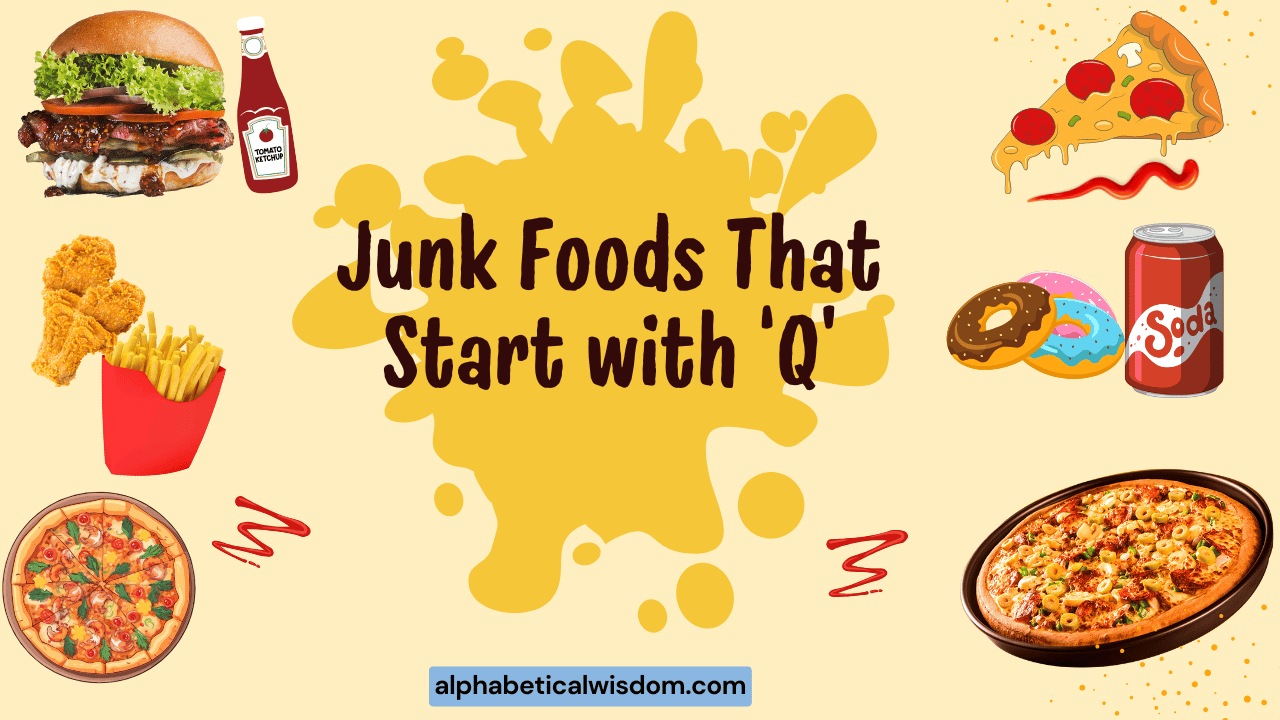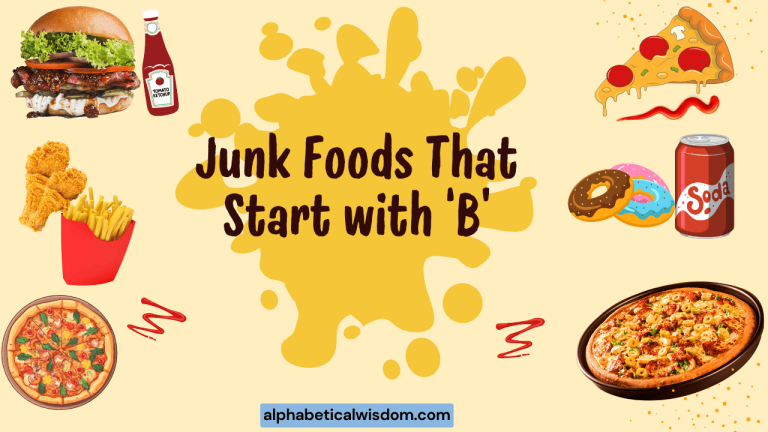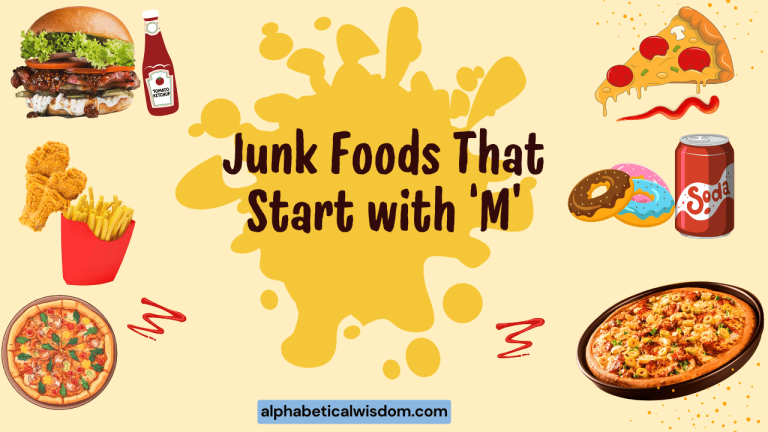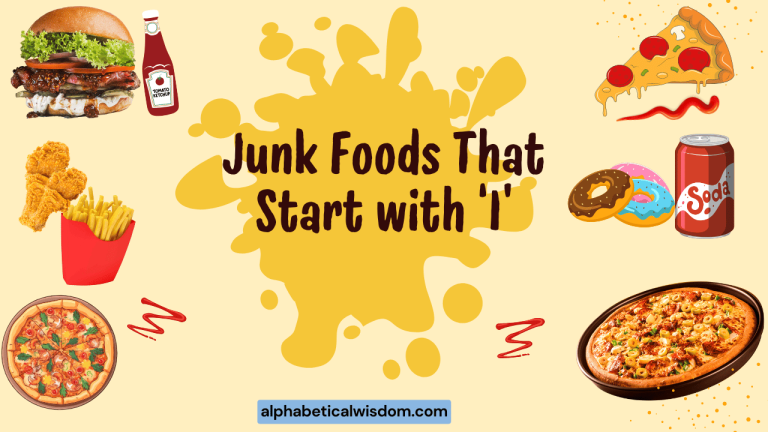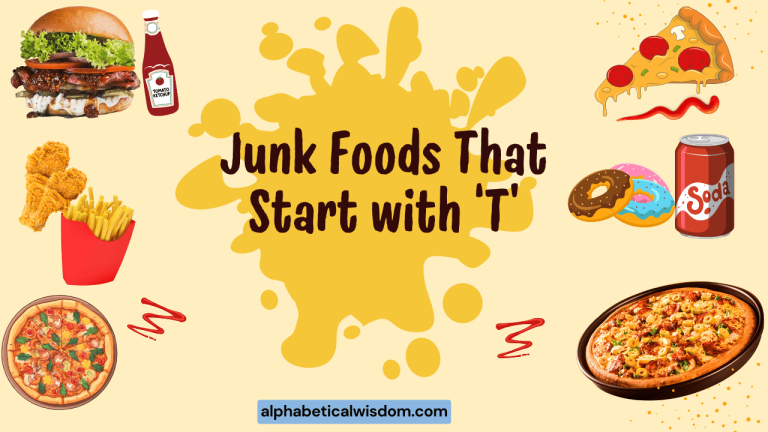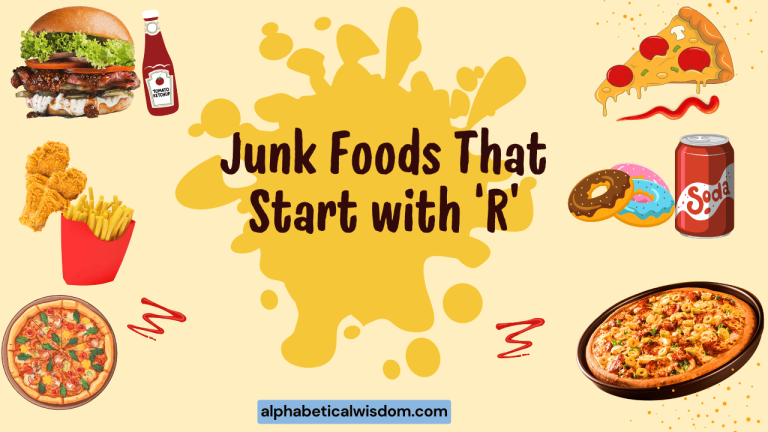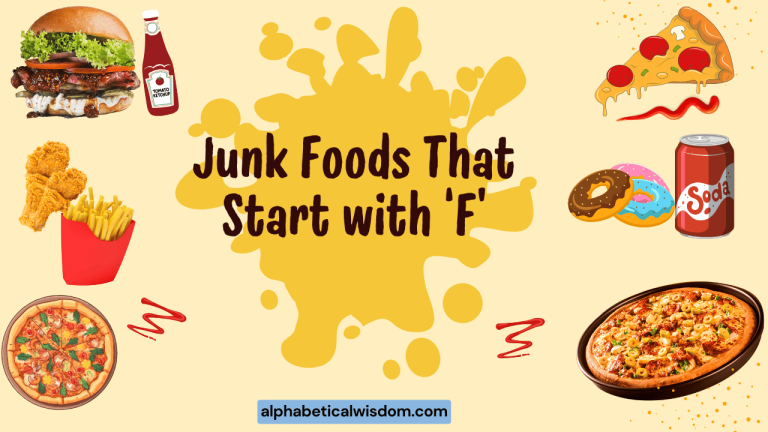Junk Foods That Start With “Q”: A Grammatical Exploration
Exploring the intriguing world of junk foods beginning with the letter “Q” may seem like a quirky endeavor, but it offers a unique lens through which to examine English grammar. This article focuses on the grammatical roles these foods play in sentences, from nouns and adjectives to their use in various sentence structures.
Understanding how these terms function enhances vocabulary, improves sentence construction, and provides a fun context for grammar practice. This guide is perfect for English language learners, food enthusiasts, and anyone looking to spice up their grammar skills with a dash of culinary vocabulary.
Table of Contents
- Introduction
- Definition: Junk Foods Starting with “Q”
- Structural Breakdown
- Types and Categories
- Examples
- Usage Rules
- Common Mistakes
- Practice Exercises
- Advanced Topics
- FAQ
- Conclusion
Definition: Junk Foods Starting with “Q”
Junk foods are generally defined as processed foods with low nutritional value but high in calories, sugars, fats, and sodium. When narrowing our focus to junk foods starting with the letter “Q,” the options are limited.
While not a common starting letter for food items, examples might include variations of foods or specific brand names. For the purpose of this article, we’ll consider any food or food-related term that starts with “Q” and aligns with the description of being a highly processed, less nutritious snack or treat.
This exploration will primarily focus on how these (admittedly rare) terms function grammatically within the English language.
The grammatical function of these foods can vary widely. They can act as nouns, representing the food item itself (e.g., “Quiche,” though not strictly junk food, serves as an example). They can also function as adjectives, describing other nouns (e.g., “quiche-like” flavor). Understanding their grammatical roles clarifies how they fit into sentences and how to use them correctly.
Structural Breakdown
The structural breakdown of junk foods starting with “Q” involves analyzing how these words are used within sentences and phrases. This includes understanding their role as nouns, adjectives, and their participation in various grammatical structures.
As nouns, these words typically act as subjects, objects, or complements within a sentence. For example, in the sentence “I ate the quiche,” “quiche” functions as the direct object of the verb “ate.” As adjectives, they modify nouns, providing additional information about them. For example, “a quiche-like pastry” uses “quiche-like” to describe the pastry.
Furthermore, analyzing the morphology (the study of word forms) of these terms can be insightful. Some “Q” junk food terms might be compound nouns (e.g., if a specific brand name combines “Q” with another word), each part contributing to the overall meaning. Understanding these structural elements allows for more precise and effective communication.
Types and Categories
Categorizing junk foods starting with “Q” based on their grammatical properties enhances our understanding of their usage. Here, we’ll look at countable vs. uncountable nouns and common vs. proper nouns.
Countable vs. Uncountable Nouns
Countable nouns are those that can be counted and have a plural form. Uncountable nouns, also known as mass nouns, cannot be counted and do not typically have a plural form. Consider “quiche” – it can be both countable and uncountable depending on the context. “I ate a quiche” (countable) versus “I ate some quiche” (uncountable).
The distinction between countable and uncountable nouns affects the articles and quantifiers used with them. Countable nouns use articles like “a” or “an” in the singular form, while uncountable nouns do not.
Quantifiers like “many” are used with countable nouns, whereas “much” is used with uncountable nouns.
Common vs. Proper Nouns
Common nouns refer to general things, places, or people, while proper nouns refer to specific, named entities. Proper nouns are always capitalized. If we were to invent a brand of quiche called “Queen’s Delight Quiche,” “Queen’s Delight Quiche” would be a proper noun, while “quiche” remains a common noun.
Understanding the difference between common and proper nouns is crucial for correct capitalization and usage. Proper nouns often require the definite article “the” when referring to a specific instance or location.
Examples
To further illustrate the grammatical roles of junk foods starting with “Q,” let’s explore various examples organized by category.
Examples of “Q” Junk Foods as Nouns
This section provides examples of how “Q” junk foods can function as nouns within sentences. While the options are admittedly limited, the principle remains the same: the word represents the food item and acts as a subject, object, or complement.
Below is a table with examples, demonstrating the use of “quiche” as a noun in different sentence structures. Note that “quiche” is being used as an example in the absence of many actual “Q” junk foods.
We are focusing on grammatical function.
| Sentence | Grammatical Role |
|---|---|
| The quiche was delicious. | Subject |
| I ordered a quiche for lunch. | Direct Object |
| My favorite food is quiche. | Subject Complement |
| We brought a quiche to the party. | Direct Object |
| She baked a quiche this morning. | Direct Object |
| The recipe calls for quiche. | Object of Preposition |
| He dreams of quiche. | Object of Preposition |
| That is a very large quiche. | Subject Complement |
| Is that quiche yours? | Subject |
| I think I’ll have some quiche. | Direct Object |
| They sell quiche at that bakery. | Direct Object |
| Making quiche is easier than you think. | Subject |
| Eating quiche always makes me happy. | Subject |
| We had quiche for dinner last night. | Direct Object |
| Quiche is a popular dish in France. | Subject |
| The smell of quiche filled the kitchen. | Subject |
| I found a great recipe for quiche online. | Direct Object |
| She is known for her amazing quiche. | Object of Preposition |
| Let’s order a quiche to share. | Direct Object |
| Quiche is best served warm. | Subject |
Examples of “Q” Junk Foods as Adjectives
In this section, we explore examples where “Q” junk food terms (or derivations thereof) function as adjectives, modifying nouns. This can involve creating descriptive terms based on the food item.
The following table uses the hypothetical “quiche-flavored” as an example to illustrate how adjectives derived from food names can be used to describe other nouns. Again, the principle remains the same even with limited real-world examples.
| Sentence | Adjective and Modified Noun |
|---|---|
| He enjoyed the quiche-flavored chips. | quiche-flavored, chips |
| She bought a quiche-like pastry. | quiche-like, pastry |
| The chef created a quiche-inspired dessert. | quiche-inspired, dessert |
| They offered a quiche-scented candle. | quiche-scented, candle |
| It has a quiche-esque texture. | quiche-esque, texture |
| The restaurant is known for its quiche-filled croissants. | quiche-filled, croissants |
| I tried a quiche-topped pizza. | quiche-topped, pizza |
| This is a quiche-themed party. | quiche-themed, party |
| The bakery sells quiche-infused bread. | quiche-infused, bread |
| I love the quiche-covered snacks. | quiche-covered, snacks |
| He made a quiche-flavored ice cream. | quiche-flavored, ice cream |
| She prepared a quiche-related dish. | quiche-related, dish |
| The event featured a quiche-based menu. | quiche-based, menu |
| They served quiche-style appetizers. | quiche-style, appetizers |
| It was a quiche-flavored drink. | quiche-flavored, drink |
| The market offers quiche-seasoned nuts. | quiche-seasoned, nuts |
| I found a quiche-blend spice. | quiche-blend, spice |
| She designed a quiche-printed apron. | quiche-printed, apron |
| The store sells quiche-aroma diffusers. | quiche-aroma, diffusers |
| I bought a quiche-decorated cake. | quiche-decorated, cake |
Examples of “Q” Junk Foods in Phrases
Phrases are groups of words that function as a unit within a sentence. Here are examples of how “Q” junk food terms might appear in phrases.
This table demonstrates how “quiche” can be incorporated into various phrases, showcasing its flexibility in language.
| Phrase | Type of Phrase |
|---|---|
| A slice of quiche | Noun Phrase |
| With quiche flavor | Prepositional Phrase |
| Eating quiche quickly | Gerund Phrase |
| To bake a quiche | Infinitive Phrase |
| Quiche, a savory treat | Appositive Phrase |
| The best quiche ever | Noun Phrase |
| Made from quiche | Participial Phrase |
| For the quiche recipe | Prepositional Phrase |
| After eating quiche | Prepositional Phrase |
| Before baking the quiche | Prepositional Phrase |
| The quiche on the table | Prepositional Phrase |
| A quiche that is delicious | Adjective Phrase |
| So much quiche | Noun Phrase |
| Too much quiche | Noun Phrase |
| Delicious quiche and salad | Noun Phrase |
| Quiche or pie | Noun Phrase |
| Baked quiche for dinner | Noun Phrase |
| Quiche with cheese | Prepositional Phrase |
| To eat quiche slowly | Infinitive Phrase |
| Quiche, a delightful dish | Appositive Phrase |
Examples of “Q” Junk Foods in Sentences
This section provides complete sentences using “Q” junk food terms, showcasing their grammatical function in context.
The following table offers a variety of sentences incorporating “quiche,” demonstrating its versatile use in different contexts and sentence structures.
| Sentence | Grammatical Emphasis |
|---|---|
| The quiche was the highlight of the brunch. | “quiche” as subject |
| She decided to order a quiche instead of a salad. | “quiche” as direct object |
| Baking a quiche requires precision and patience. | “quiche” as part of a gerund phrase |
| He brought a quiche-flavored dip to the party. | “quiche-flavored” as adjective |
| The aroma of quiche filled the entire kitchen. | “quiche” as part of a prepositional phrase |
| Eating quiche for breakfast is a delightful treat. | “quiche” as part of a gerund phrase |
| The restaurant is famous for its unique quiche recipes. | “quiche” as adjective modifying “recipes” |
| They served a quiche-like pastry at the café. | “quiche-like” as adjective |
| I found a recipe online for a vegetarian quiche. | “quiche” as noun |
| She is known for her amazing quiche, which everyone loves. | “quiche” as noun |
| Let’s try the new quiche-infused olive oil. | “quiche-infused” as adjective |
| The chef created a quiche-inspired appetizer. | “quiche-inspired” as adjective |
| We decided to bake a quiche for the picnic. | “quiche” as direct object |
| The quiche on the table looks absolutely delicious. | “quiche” as subject |
| I prefer quiche with a side of fresh salad. | “quiche” as noun |
| She added quiche-seasoned breadcrumbs to the dish. | “quiche-seasoned” as adjective |
| The bakery sells a variety of quiche-filled croissants. | “quiche-filled” as adjective |
| He decorated the cake with quiche-flavored frosting. | “quiche-flavored” as adjective |
| I ordered a quiche for lunch today. | “quiche” as direct object |
| Quiche is one of my favorite dishes. | “quiche” as subject |
Examples of Compound Nouns with “Q” Junk Foods
Compound nouns are formed when two or more words are used together to form a single noun. While less common with “Q” junk foods, the principle can be illustrated.
This table shows how “quiche” can be combined with other words to create compound nouns, expanding its usage and meaning within specific contexts.
| Compound Noun | Example Sentence |
|---|---|
| Quiche-lover | He is a true quiche-lover, always seeking out new recipes. |
| Quiche-making | Quiche-making is a fun and rewarding culinary activity. |
| Quiche-baking | She enjoys quiche-baking on Sunday mornings. |
| Quiche-tasting | The annual quiche-tasting event is a local favorite. |
| Quiche-seller | The quiche-seller at the market always has a long line. |
| Quiche-shop | Let’s go to the new quiche-shop downtown. |
| Quiche-dish | This quiche-dish is perfect for a family meal. |
| Quiche-recipe | I found a great quiche-recipe online. |
| Quiche-crust | The quiche-crust was perfectly flaky. |
| Quiche-filling | The quiche-filling was rich and creamy. |
Usage Rules
Proper usage of “Q” junk food terms requires adherence to standard English grammar rules. This includes subject-verb agreement, correct article usage, and appropriate preposition usage.
Subject-Verb Agreement
Subject-verb agreement means that the verb in a sentence must agree in number (singular or plural) with its subject. If the subject is singular, the verb must be singular; if the subject is plural, the verb must be plural. For example: “The quiche *is* delicious” (singular) vs. “The quiches *are* delicious” (plural).
Pay close attention to compound subjects (two or more subjects joined by “and”) which generally take a plural verb. For example: “Quiche and salad *are* a great combination.”
Use of Articles (a, an, the)
Articles are words used to define a noun as specific or unspecific. “A” and “an” are indefinite articles, used to refer to a non-specific or general noun. “The” is the definite article, used to refer to a specific or particular noun.
Use “a” before words that begin with a consonant sound (e.g., “a quiche”) and “an” before words that begin with a vowel sound. Use “the” when referring to a specific instance of the noun (e.g., “the quiche I ordered”).
Prepositions with “Q” Junk Foods
Prepositions are words that show the relationship between a noun or pronoun and other words in a sentence. Common prepositions include “of,” “with,” “in,” “on,” “at,” “for,” “to,” and “from.”
The choice of preposition depends on the context and the specific relationship you want to express. For example: “a slice *of* quiche,” “quiche *with* cheese,” “baked *in* a quiche dish,” “a recipe *for* quiche.”
Common Mistakes
Several common mistakes can occur when using “Q” junk food terms in sentences. Recognizing and correcting these errors can significantly improve your writing and speaking skills.
Here is a table illustrating common mistakes and their corrections, focusing on aspects like subject-verb agreement, article usage, and preposition selection.
| Incorrect | Correct | Explanation |
|---|---|---|
| Quiche are delicious. | Quiche is delicious. | Subject-verb agreement (assuming “quiche” refers to the dish in general). |
| I want a quiche. | I want some quiche. | Using “some” as “quiche” is often uncountable. |
| I ate the quiche. | I ate quiche. | The article “the” is not needed when speaking generally about the dish. |
| Recipe of quiche. | Recipe for quiche. | Correct preposition usage. |
| Quiche flavored ice cream. | Quiche-flavored ice cream. | Hyphenating compound adjectives. |
| I like quiches. | I like quiche. | Using “quiche” as uncountable. |
| She baked a quiche yesterday. | She baked quiche yesterday. | The article “a” is not needed as “quiche” is uncountable. |
| Quiche is my favorite. | Quiche is my favorite dish. | Adding dish for clarity. |
| I found a quiche recipe. | I found a quiche recipe online. | Adding online for clarity. |
| He made quiche filled croissants. | He made quiche-filled croissants. | Hyphenating compound adjectives. |
Practice Exercises
These exercises will help you practice using “Q” junk food terms correctly in different contexts. Each exercise focuses on a specific aspect of grammar.
Exercise 1: Identifying Nouns
Identify the noun in each sentence. If there is no “Q” junk food noun, write “None.”
| Question | Answer |
|---|---|
| 1. The quiche was delicious. | Quiche |
| 2. She enjoys baking cakes. | None |
| 3. I ate a slice of quiche. | Quiche |
| 4. He prefers pizza for dinner. | None |
| 5. We bought some quiche for the party. | Quiche |
| 6. She made a delicious salad. | None |
| 7. The quiche recipe is easy to follow. | Quiche, recipe |
| 8. I love chocolate ice cream. | None |
| 9. Quiche is a savory dish. | Quiche, dish |
| 10. He enjoys cooking pasta. | None |
Exercise 2: Sentence Completion
Complete each sentence with an appropriate “Q” junk food term (or a related term) from the options provided.
| Question | Options | Answer |
|---|---|---|
| 1. I ordered a _____ for lunch. | (salad, quiche, sandwich) | quiche |
| 2. She made a _____ dessert. | (quiche-inspired, chocolate, vanilla) | quiche-inspired |
| 3. The aroma of _____ filled the kitchen. | (coffee, quiche, bread) | quiche |
| 4. He added _____ to the dish. | (quiche-seasoned breadcrumbs, salt, pepper) | quiche-seasoned breadcrumbs |
| 5. They served a _____ at the café. | (quiche-like pastry, cake, cookies) | quiche-like pastry |
| 6. She is a true _____. | (quiche-lover, cake-lover, pie-lover) | quiche-lover |
| 7. The event featured a _____ menu. | (quiche-based, meat-based, fish-based) | quiche-based |
| 8. I found a great _____ online. | (quiche-recipe, cake-recipe, bread-recipe) | quiche-recipe |
| 9. Let’s go to the new _____. | (quiche-shop, bakery, café) | quiche-shop |
| 10. The _____ was perfectly flaky. | (quiche-crust, cake-crust, pie-crust) | quiche-crust |
Exercise 3: Error Correction
Correct the grammatical errors in the following sentences.
| Question | Corrected Answer |
|---|---|
| 1. Quiche are my favorite. | Quiche is my favorite dish. |
| 2. I want a quiche. | I want some quiche. |
| 3. She baked a quiche yesterday. | She baked quiche yesterday. |
| 4. Recipe of quiche. | Recipe for quiche. |
| 5. Quiche flavored ice cream. | Quiche-flavored ice cream. |
| 6. I like quiches. | I like quiche. |
| 7. She make a quiche inspired dessert. | She made a quiche-inspired dessert. |
| 8. He added quiche seasoned breadcrumbs. | He added quiche-seasoned breadcrumbs. |
| 9. They served a quiche like pastry. | They served a quiche-like pastry. |
| 10. This is a quiche shop. | Let’s go to this quiche-shop. |
Exercise 4: Sentence Building
Create sentences using the given words related to “Q” junk food topics.
| Words | Example Answer |
|---|---|
| 1. quiche, delicious, is | The quiche is delicious. |
| 2. made, quiche, she | She made quiche for lunch. |
| 3. flavor, quiche-inspired, new | The new flavor is quiche-inspired. |
| 4. aroma, kitchen, quiche | The aroma of quiche filled the kitchen. |
| 5. recipe, found, quiche | I found a quiche recipe online. |
| 6. shop, quiche, to | Let’s go to the quiche shop. |
| 7. crust, the, flaky | The crust was flaky. |
| 8. favorite, dish, quiche | Quiche is my favorite dish. |
| 9. party, quiche, for | We brought quiche for the party. |
| 10. they, pastry, quiche-like | They served a quiche-like pastry. |
Advanced Topics
For advanced learners, exploring idiomatic expressions and figurative language involving “Q” junk food terms can offer deeper insights into the nuances of English.
Idiomatic Expressions
Idiomatic expressions are phrases or sayings whose meaning cannot be understood from the literal meanings of the individual words. While rare with “Q” junk foods, the principle applies. For example, if “quiche” became associated with a particular life style, phrases might develop around that association.
Understanding idiomatic expressions requires familiarity with cultural contexts and common usage. Pay attention to how native speakers use these expressions in conversation and writing.
Figurative Language
Figurative language uses words or expressions with a meaning that is different from the literal interpretation. This includes metaphors, similes, and personification.
For example, one might say, “Her quiche was a symphony of flavors,” using a metaphor to describe the complexity and harmony of the dish. Similarly, “The quiche was as warm as a summer’s day” uses a simile to create a vivid comparison.
FAQ
Here are some frequently asked questions about using “Q” junk food terms in English, along with detailed answers.
- Is “quiche” considered junk food?
While quiche isn’t traditionally classified as junk food due to its egg and dairy base, commercially produced versions with high fat and sodium content could be considered less healthy. In the context of this article, it serves as a primary example due to the rarity of actual “Q” junk foods. The grammatical principles, however, remain the same.
- Can “quiche” be both a countable and uncountable noun?
Yes, “quiche” can be both countable and uncountable depending on the context. “I ate a quiche” (countable, referring to a whole quiche) versus “I ate some quiche” (uncountable, referring to a portion of quiche).
- How do I use adjectives derived from “quiche” correctly?
Adjectives like “quiche-flavored” or “quiche-inspired” should be placed before the noun they modify and are often hyphenated. For example, “quiche-flavored chips” or “a quiche-inspired dessert.”
- What prepositions are commonly used with “quiche”?
Common prepositions include “of” (a slice of quiche), “with” (quiche with cheese), “for” (a recipe for quiche), and “in” (baked in a quiche dish). The choice depends on the specific relationship you want to express.
- How does subject-verb agreement work with “quiche”?
If you’re referring to quiche in general, use a singular verb: “Quiche is delicious.” If you’re referring to multiple quiches, use a plural verb: “The quiches are delicious.”
- When should I use the article “the
” with “quiche”?
Use “the” when referring to a specific quiche or a particular instance of quiche. For example, “The quiche I ordered was amazing.” If you’re speaking generally about quiche, you don’t need an article: “Quiche is a popular dish.”
Conclusion
While exploring junk foods starting with the letter “Q” presents unique challenges due to the limited options, it offers a creative and engaging way to reinforce English grammar concepts. By examining how terms like “quiche” function as nouns, adjectives, and within various sentence structures, learners can deepen their understanding of grammar rules and improve their overall language proficiency.
This exercise underscores the importance of context in language learning and encourages a playful approach to mastering grammar.
